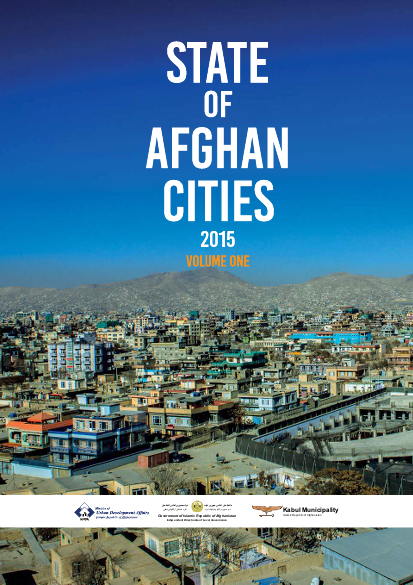Volume 1

This report presents the first-ever comprehensive and reliable assessment of Afghanistan’s 34 Provincial Capital Cities. It is a key output from the ambitious one-year programme, The State of Afghan Cities 2014/15, developed and implemented by three lead partners: Ministry of Urban Development Affairs (MUDA), Independent Directorate of Local Governance (IDLG), and Kabul Municipality (KM); with technical assistance from the United Nations Human Settlements Programme (UN-Habitat) and financial support from the Government of Australia.
The programme developed an innovative, reliable and cost-effective methodology in order to examine the ‘state’ of Afghanistan’s major cities. It used recent and high-resolution satellite images to extract key landuse and dwelling data. This was combined with field checks and city workshops to engage local stakeholders, improve data accuracy, and build human and institutional capacities for improved urban data monitoring and use.
Overall, the report demonstrates that because the ‘urban agenda’ has been largely missing in the past decade, Afghan cities have grown haphazardly, informally, with limited access to affordable and quality basic services, and with considerable socio-economic divisions and exclusion. There has been insufficient national policy and regulations to guide urban development; limited realistic and grounded spatial plans; and weak municipal governance to ensure equitable service delivery and effective management of the inevitable urbanisation transition facing the country.
The programme and this associated report come at an opportune time. The ‘urban agenda’ has been explicitly prioritized by the National Unity Government of Afghanistan as a driver of economic and social development. This recognition that urbanisation is an inevitable phenomenon is long overdue.
Urbanisation is not a problem to be solved but, if done well, is an effective instrument and driver of prosperity, stabilisation, and state building. The basis for harnessing urbanisation is having accurate and timely information upon which to base policy and planning decisions. This report makes a step forward in this direction.
Resource collections
- UN Habitat - Urban Response Collection
- Urban Response - Urban Crisis Preparedness and Risk Reduction
- Urban Response Collection - Community Engagement and Social Cohesion
- Urban Response Collection - Economic Recovery
- Urban Response Collection - Environment and Climate Change
- Urban Response Collection - Housing, Land and Property
- Urban Response Collection - Urban Crisis Response, Recovery and Reconstruction
- Urban Response Collection - Urban Resilience